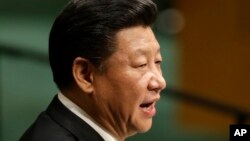A senior South Korean official says Chinese President Xi Jinping’s recent warning against provocative actions on the Korean peninsula was intended as a warning message to North Korea.
After meeting with U.S. President Barack Obama, Xi told reporters on Friday China was opposed to “any actions that might cause tension in the Korean Peninsula or violate U.N. Security Council resolutions.”
The Chinese leader said the U.N. actions “should be implemented in full and all relevant parties should work together to firmly advance the denuclearization process of the Korean peninsula.”
The South Korean official, who asked to remain anonymous, told VOA Monday that Xi’s comments came in response to North Korea’s recent threat that it might conduct a long-range rocket launch and nuclear test.
The official said the North Korean threat appeared to be timed for the meeting between Obama and Xi and the Chinese leader warned its ally of taking any provocative actions. Despite the warning, Beijing’s strategic stance on Pyongyang appears unchanged, according to the official.
Another official said it is not unusual for Beijing to stress the implementation of U.N. actions, adding it is worth noticing that Xi made the remarks in public.
Beijing's strategic asset
Lim Eul-chul, a professor at Kyungnam University’s Institute for Far Eastern Studies, said China still sees North Korea as its strategic asset although Beijing seems firmly opposed to any long-range rocket launch or nuclear test by Pyongyang.
“Xi apparently sent a message to Pyongyang that Beijing will join the U.N. efforts to take further actions against Pyongyang if it proceeds with the threat,” said Lim.
Kim Yong-hyun, a professor at Dongguk University, said China’s participation in the U.N. actions to impose additional sanctions on North Korea is likely to be limited even if North Korea conducts a long-range rocket launch or nuclear test.
“Given the geopolitical environment, Beijing is unlikely to take any actions against Pyongyang that is more than what is needed for fear of antagonizing its ally,” said Kim.
However, Kim expected Pyongyang’s actions to further strain bilateral ties between Beijing and Pyongyang.
“The possibility of Kim Jong Un’s visit to Beijing gets dimmer if Pyongyang proceeds with such a launch,” said Kim.
North Korea remains defiant
On Monday, South Korean President Park Geun-hye called on North Korea to refrain from provocative actions.
“This will not only do harm to the hard-won mood for inter-Korean dialogue, but also undermine the efforts of the members of the Six-Party Talks to reopen denuclearization talks,” said Park in her speech to the U.N. General Assembly.
Earlier, North Korea’s official newspaper Rodong Sinmun insisted Pyongyang has the right to conduct a long-range rocket launch and nuclear test, calling it “the legitimate exercise of independent rights as a sovereign country.”
Jee Abbey Lee contributed to this report, which was produced in collaboration with the VOA Korean service.




